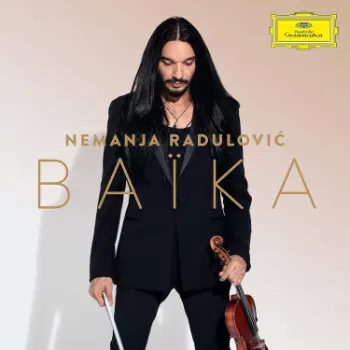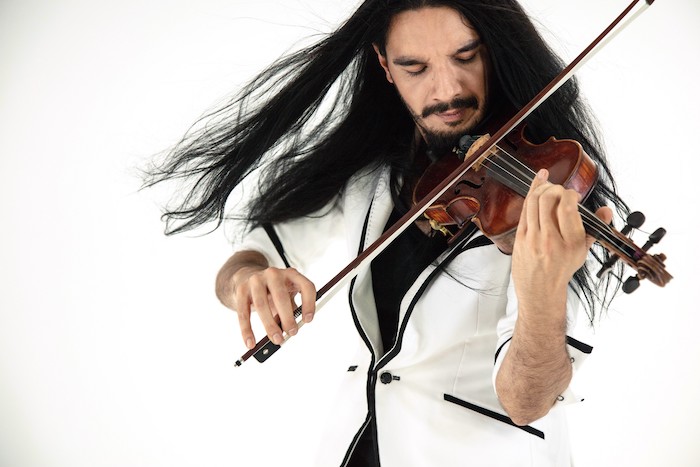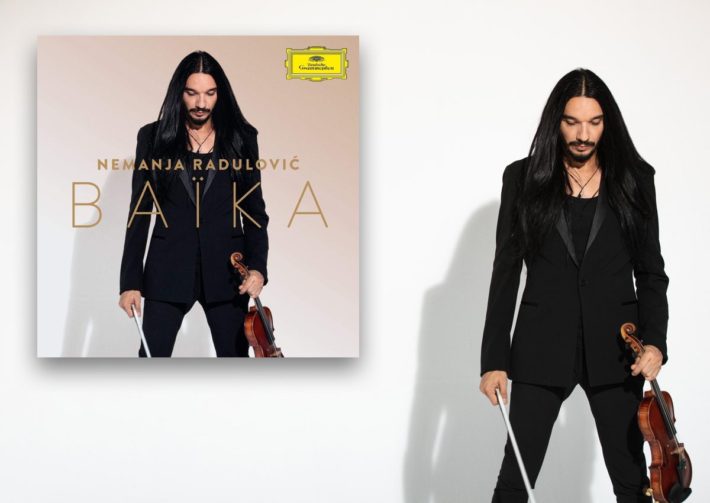Khachaturian’s Violin Concerto is quite a rarity these days, unjustifiably so. It used to have some big names promoting it on stage and on the recording studio, like its dedicatee David Oistrakh and Leonid Kogan. This newcomer puts this concerto as the center of a well planned, “oriental” related theme album, named “Baïka” (“Tale”).

In the Violin Concerto, Radulovic is accompanied, as in his previous album, by The Borusan Istanbul Philharmonic Orchestra under Sascha Goetzel.
Right from the first bars of the concerto, you can hear the participants’ enthusiasm and commitment to this lively piece, but the real magic starts with the appearance of the second theme at around 1:50. oistrakh and Kogan played this theme like, well, Russian music. Radulovic gives it a personal touch with little vibrato, small intonation changes and bow coloring. It’s highly effective and never heard this way before. Lovely woodwind accompaniment as well. The long and difficult cadenza has these small personal touches as well (7:20), with fascinating dialogue with the clarinet and a dramatic return of the full orchestra.
The second movement is just right for “Andante Sostenuto” instructed by the composer, and the almost chilling stillness the soloist and orchestra manage to achieve is nothing but superb. The group really let’s go in the finale. If in this movement Oistrach was blissfully Cheerful, Radulovic has a more casual approach, which works well in the orchestra sections’ dialogues with the soloist (1:20 onward).
From the current digital versions available for the concerto, I know of no better representation of this lovely music, and it’s a highly welcome release if one has to go back to the ’50s and ’60s to find as dedicated and exciting performance as this. The only reservation here is that contrary to Radulovic and this orchestra’s previous joined album, the recording quality is not as good; The acoustic is noticeably drier and the percussions are too closely recorded (Editor’s note: we had no success getting information about the recording locations and timing from Deutsche Grammophon although few attempts have been made).

The next piece in this album, as in the previous Tchaikovsky album (Review: Radulovic Performs Tchaikovsky’s Violin Concerto), Is an arrangement. Alexander Sedlar’s take on Rimsky-Korsakov’s Scheherazade, arranged for strings, piano and violin solo is very enjoyable indeed, taking advantage of the many violin solos originally existing in the orchestral score of the entire suite. It’s also very nicely orchestrated, giving some interesting colors to the ensemble (“Double Sens”) using different registers, pizzicatos and combination with the piano. The arrangement is, in essence, four short homages to the original score (including a rather comical tripled rhythm dance in the third movement). Radulovic playing is superb, wishing one could hear him take the first violin chair when a full orchestra plays the original.
After these four short movements, we get back to Khachaturian, with the youthful trio for clarinet, violin and piano. This is where the programming becomes clearer, as some of the parts are strikingly resembling to Scheherazade, as well as to the Violin Concerto which came years after this trio. It’s a fine performance (especially in the final movement), including some marvelous playing from the Berlin Philharmonic first clarinet, Andreas Ottensamer and pianist Laure Favre Kahn. All-in-all, if we are honest, it’s a less exciting nor original piece as the Violin Concerto, but an enjoyable addition to this well-filled album nonetheless and shows what an original composer Khachaturian was even in his young years (1932).
The album finishes with a flair, this time Alexander Sedlar original piece, “Savcho 3” (the digital album includes additional, bonus track). Hear it, and see if you could stay indifferent. These two last tracks, as well as the Scheherazade arrangement and in contrary to the somewhat dry concerto recording, is very well engineered, with a lot of breathing space and well balanced, deep base and penetrating trebles.
An interesting, generous, highly engaging and welcomed addition to a strangely underrepresented repertoire. Recommended.
Top Images: Lukas Rotter / DG

“BAÏKA”
Khachaturian – Violin Concerto, trio for violin, clarinet & piano
Rimsky-Korsakov – Scheherazade (Arrangement for violin, string orchestra and piano by Alexander Sedlar)
Alexander Sedlar – “Savcho 3”, “Turkey”
Nemanja Radulovic – Violin
Borusan Istanbul Philharmonic Orchestra
Sascha Goetzel – Conductor
Double Sens
Andreas Ottensamer – Clarinet
Laure Favre-Kahn – Piano
Deutsche Grammophon, CD 0289 479 7545 8



















